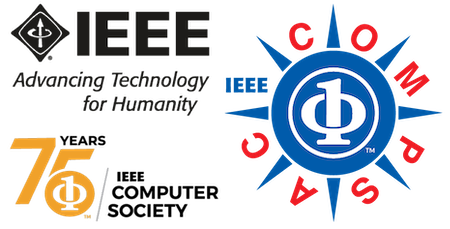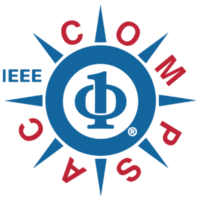The 13th IEEE International Workshop on Software Test Automation (STA 2021)
Call for Papers
Test automation aims to reduce the cost and improve the effectiveness of software testing by using various techniques and methods. Other benefits are consistency and accuracy, reduction of overall test cycle time, risk mitigation of manual testing, and increase in overall product quality. Recording test activities as test scripts and playing the test scripts or record and playback are the common methods. More advanced methodologies include data-driven, keyword-driven and hybrid methods as well as framework-based methods. Among tool development, interoperability remains a major challenge.
This year’s theme of COMPSAC is “Intelligent and Resilient Computing for a Collaborative World”. The global COVID-19 pandemic has fundamentally changed how we work with each other on a regular basis. Limitations on in-person interactions have caused a dramatic increase in our use and reliance on collaborative technology to enable normal communication. Family and friends have conversations via video chat, students utilize online learning instead of in-person instruction, and medical professionals treat patients remotely. These are only a few examples of how interactive software and applications have provided the foundation for continued normal day-to-day activities. But as use of these tools has rapidly accelerated, some limitations and shortcomings have also been discovered. Many components support online collaborative services, including bare-metal hardware, massive back-end storage, and high-speed, high-throughput networking, as well as the software required to administer these components efficiently. In many cases, the resilience of these underpinnings has been tested by unprecedented levels of demand, stressing systems and exposing weaknesses. As computer researchers, we see these weaknesses as opportunities to fill gaps in how software and applications are developed, utilized, and supported. How to improve the resiliency of these components across a wide range of use domains is a significant challenge we suddenly find ourselves facing. How do we design systems that are able to withstand the stress of global-scale use, and still provide robust and secure services to end-users?
Accordingly, submissions including applications and case studies in these areas will highly be appreciated.
Scope of the workshop:
Topics of interest include, but are not limited to, the following
- Test automation for large, complex systems
- Testing in Continuous Integration / Continuous Development (CI/CD) pipeline and DevOps.
- Early defect detection, reducing development timeline
- Reliability testing, Mean Time between Failures (MTBF)
- Test modeling and test methodologies
- Exploratory Testing
- Combinatorial testing, Test input generation
- Model Based Testing, Keyword Based Testing
- Test automation in the context of different software development lifecycle methodologies
- Design of high-quality, reusable tests
- Product Line Testing
- Test-driven development and behavior driven testing
- Operation, maintenance and evolution of test tools and environments
- Application in different domains – digital world, cloud computing, healthcare
- Experiments, empirical studies, experience reports, and case studies.
- Support for testing methods, test framework, test infrastructure.
- Management of distributed test assets and test environments
- Development, operation, integration, and standardization of test tools
- Test metrics to measure test efficiency and test coverage optimization
- Test efficiency, Test effectiveness, and Lean testing approaches.
- Quantitative studies including cost vs. benefit studies.
Important Dates
Workshop papers due: 21 April 1 May 2021 (UPDATED)
Workshop paper notifications: 15 May 2021
Camera-ready and registration due: 31 May 2021
Authors are invited to submit original, unpublished research work, as well as industrial practice reports. Simultaneous submission to other publication venues is not permitted. In accordance with IEEE policy, submitted manuscripts will be checked for plagiarism. Instances of alleged misconduct will be handled according to the IEEE Publication Services and Product Board Operations Manual.
Please note that in order to ensure the fairness of the review process, COMPSAC follows the double-blind review procedure. Therefore we kindly ask authors to remove their names, affiliations and contacts from the header of their papers in the review version. Please also redact all references to authors’ names, affiliations or prior works from the paper when submitting papers for review. Once accepted, authors can then include their names, affiliations and contacts in the camera-ready revision of the paper, and put the references to their prior works back.
Formatting
Workshop papers are limited to 6 pages. Page limits are inclusive of tables, figures, appendices, and references. Workshop papers can add an additional 2 pages with additional page charges ($250USD/page).
Paper Templates
IEEE Paper templates are available in MS Word 2003 and LaTex. All submissions must use US 8.5×11 letter page format.
Note: If the submission link does not appear on EasyChair after logging-in, please click the above button again.
Workshop Organizers
Rajesh Subramanyan, Amazon Web Services, USA
Email: subramanr19@gmail.com
T.H. Tse, The University of Hong Kong
Email: thtse@cs.hku.hk
Emeritus
Fevzi Belli, University of Paderborn
Email: belli@upb.de
Program Committee
Xiaoying Bai, Tsinghua University, China
Christof Budnik, Siemens, USA
Arilo Claudio, Federal University of Amazonas, Brazil
Atilla Elci, Eastern Mediterranean University, North Cyprus
Jerry Gao, San Jose State University, USA
Ron Kenett, KPA Ltd, Israel
Yvan Labiche, Carleton University, Canada
Juncao Li, Microsoft, USA
Aditya Mathur, Purdue University, USA
Ina Schieferdecker, Fraunhofer FOKUS, Germany
Marek Stochel, Motorola Solutions, Poland
Guilherme Travassos, Federal University of Rio de Janerio (UFRJ), Brazil
Dragos Truscan, Ãbo Akademi University, Finland
Tugkan Tuglular, Izmir University, Turkey
Mario Winter, Univ. of Applied Science, Cologne, Germany
Dave Towey, The University of Nottingham, China
Fie Xie, Portland State University, USA
Hong Zhu, Oxford Brookes University, UK

